The People’s Bank of China is seeing a slowdown in the frenzied bond rally in the country as prices fall and turnover decreases due to increased intervention by Beijing to prevent yields from dropping. Despite economic indicators pointing to a slowing economy in need of policy easing and bond buying, ten-year treasury futures are heading for a second consecutive weekly drop, the largest in almost a year. Exchange-traded bond funds in China experienced high outflows while state banks were selling heavily and warnings against reckless buying were being reported.
The market is bracing for a clash with authorities as more bond sales are expected in the upcoming weeks and months. The Chief Investment Officer at JPMorgan Asset Management acknowledged the new round of actions by the People’s Bank of China and has been reducing his long position in Chinese government bonds in response to their efforts to cool the rally. Long-dated bonds have been the focus as risks of an asset bubble are identified, leading to restrictions on bond funds and increased scrutiny on brokers and banks. Yields on ten-year and 30-year bonds have risen in response to falling prices.
The number of wealth management products whose market value dropped below the net asset value has increased significantly, indicating a market deterioration. Trading volume for China’s current 10-year note has significantly decreased compared to the previous week, showing signs of weakness in the market. Analysts express concerns about the impact of the authorities’ measures on market participants’ willingness to trade, potentially undercutting the market’s financing and investing purpose.
Despite the ongoing bond rally, authorities in China are committed to maintaining a supportive monetary policy and policy stability. The volatility in the bond market stems from a number of factors, including the economic slowdown, low bank lending rates, and a significant influx of idle bank capital into bonds. Concerns about a market bubble and a lack of productive use of capital prompt authorities to intervene and discourage excessive bond buying.
The battle between market participants and authorities in China is intensifying as the forces driving the bond rally show no signs of weakening. Bond supply remains a wildcard, as China has only sold a fraction of the bonds planned for the year. Foreign investors, attracted by lucrative swap rates, may take the opportunity to book profits and close positions, adding to the market uncertainty. In preparation for potential volatility, banks are looking to seize trading opportunities and adjust their strategies accordingly.


























